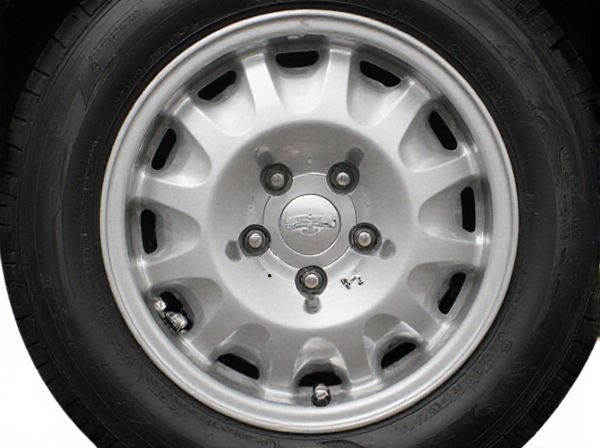
Photo illustration: True Centerlock vs Bolt-on Centerlock Wheel
True centerlock wheels feature a single locking mechanism that ensures precise alignment and faster installation compared to bolt-on centerlock wheels, which use multiple lug bolts to secure the wheel. The True centerlock design offers enhanced rigidity and is favored in high-performance or racing applications for its quick wheel changes. Your choice between the two depends on the balance you seek between convenience, weight savings, and the intended use of the vehicle.
Table of Comparison
| Feature | True Centerlock Wheel | Bolt-on Centerlock Wheel |
|---|---|---|
| Mounting Mechanism | Single central nut locks the wheel | Wheel bolts attach to a centerlock hub adapter |
| Installation Speed | Faster; one nut only | Slower; multiple bolts |
| Weight | Lighter due to minimal hardware | Heavier from additional bolts and adapter |
| Security | High; resistant to loosening | Moderate; relies on multiple fasteners |
| Common Use | Racing and high-performance cars | Street cars with centerlock retrofit |
| Cost | More expensive, precision parts | Less expensive, simpler design |
| Maintenance | Requires torque tool for single nut | Requires checking multiple bolts |
Introduction to Centerlock Wheel Systems
True centerlock wheel systems use a single central locking nut to secure the wheel, enabling faster wheel changes and improved alignment compared to traditional bolt-on designs. Bolt-on centerlock wheels rely on multiple lug nuts or bolts distributed around the wheel hub, which can add weight and slightly increase change time. High-performance vehicles and racing applications often prefer true centerlock systems for their efficiency and precise fitment advantages.
What Is a True Centerlock Wheel?
A true centerlock wheel features a single large central locking nut that securely attaches the wheel to the hub, enabling quicker wheel changes compared to traditional bolt-on designs. This system is commonly used in racing applications and high-performance vehicles due to its lightweight construction and enhanced safety. Unlike bolt-on centerlock wheels that use multiple lug nuts, the true centerlock design reduces rotational mass and improves maintenance efficiency.
Understanding Bolt-on Centerlock Wheels
Bolt-on centerlock wheels use multiple bolts to secure the wheel hub, providing a straightforward and reliable attachment method favored in motorsports for quick tire changes. This design enhances rigidity and stability compared to traditional lug nut systems, improving overall vehicle performance and safety. Understanding bolt-on centerlock wheels involves recognizing their balance between ease of maintenance and optimal wheel positioning under high stress conditions.
Key Differences Between True and Bolt-on Centerlock
True Centerlock wheels feature a single, large locknut securing the wheel to the hub, allowing faster wheel changes and better load distribution during high-performance driving. Bolt-on Centerlock wheels use multiple smaller bolts around the hub, providing easier compatibility with existing bolt patterns but increasing weight and wheel change time. True Centerlock systems offer improved safety and performance benefits in motorsport applications, while bolt-on centerlock wheels balance convenience and adaptability for street use.
Installation Process: True vs Bolt-on Centerlock
True centerlock wheels utilize a single large central nut that requires specialized torque tools for installation, ensuring precise alignment and quicker wheel changes, often favored in professional motorsports. Bolt-on centerlock wheels use multiple smaller bolts arranged in a circle, which are easier to handle with standard tools but typically take more time to install and align properly. The true centerlock system offers a streamlined installation process with enhanced retention, while bolt-on systems provide greater accessibility and versatility for regular maintenance.
Performance Impact: Handling and Safety
True Centerlock wheels provide superior handling precision by minimizing wheel movement and ensuring consistent alignment under high-stress conditions, which enhances overall vehicle stability and responsiveness. Bolt-on centerlock wheels offer easier maintenance and quicker wheel changes but can introduce slight play or alignment variances that may affect handling consistency during aggressive driving. From a safety perspective, True Centerlock systems reduce the risk of wheel loosening at high speeds, while bolt-on designs rely heavily on proper torque application to maintain secure mounting and avoid potential safety hazards.
Compatibility With Vehicles and Hubs
True centerlock wheels feature a single large locking nut that requires specific hub compatibility commonly found on high-performance and racing vehicles, ensuring a secure fit but limiting their use to cars designed with this system. Bolt-on centerlock wheels use multiple lug bolts or studs compatible with a broader range of vehicle hubs, making them more versatile for everyday vehicles and aftermarket applications. Vehicle compatibility depends on the hub design; true centerlock hubs offer rapid wheel changes but require precise fitment, whereas bolt-on systems provide easier interchangeability across various car models.
Maintenance and Longevity Comparison
True centerlock wheels feature a single locking nut mechanism that simplifies tire changes and reduces the number of components exposed to wear, leading to potentially lower maintenance requirements. Bolt-on centerlock wheels use multiple bolts, which necessitate periodic torque checks and can be more susceptible to loosening or corrosion, impacting long-term durability. The True centerlock design typically offers enhanced longevity due to fewer fasteners and improved load distribution, resulting in a more secure and reliable wheel attachment over time.
Cost Analysis: True Centerlock vs Bolt-on Centerlock
True centerlock wheels typically incur higher initial costs due to specialized hubs and precise manufacturing requirements, often favored in professional racing for their quick wheel change capability. Bolt-on centerlock wheels generally offer a more affordable alternative with simpler installation and maintenance, making them popular for aftermarket upgrades and everyday driving. Long-term cost considerations include potential savings on labor time with true centerlock systems versus lower replacement parts expenses for bolt-on designs.
Which Centerlock System Should You Choose?
True Centerlock wheels feature a single large locking nut for quicker wheel changes and improved weight distribution, favoring performance-focused applications like racing. Bolt-on centerlock wheels use multiple smaller bolts, offering ease of maintenance and compatibility with standard tools, making them suitable for everyday vehicles. Choosing between True Centerlock and bolt-on centerlock wheels depends on your priority for speed and performance versus convenience and maintenance flexibility.
 caratoz.com
caratoz.com